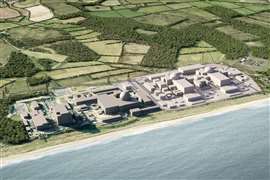Read this article in French German Italian Portuguese Spanish
UK Chancellor sets out plans for £39bn affordable homes programme
11 June 2025
 UK Chancellor Rachel Reeves (Image: Lauren Hurley / No 10 Downing St)
UK Chancellor Rachel Reeves (Image: Lauren Hurley / No 10 Downing St)
UK Chancellor Rachel Reeves has confirmed a £39 billion (€45.8 billion) investment in a new 10-year Affordable Homes Programme.
The plan involves an increase spending level of around £3.9 billion (€4.6 billion) a year on affordable housing over the 10-year period from 2026 to 2036.
Reeves has also announced plans to allow more private investment in social housing projects, by changing the borrowing rules to allow housing agency Homes England access to a further £10 billion (€11.7 billion).
Reeves claimed that the move amounts to the “biggest injection into social and affordable housing in 50 years.”
It comes as the government is under pressure to increase the level of housebuilding in the country, amid housing shortages and high costs.
Commenting on the news, Eoghan O’Lionaird, chief executive of developer and contractor Wates Group said, “The announcement today of £39 billion for affordable housing is a positive first step in helping to deliver at pace and scale the homes the country desperately needs. A 10-year funding horizon potentially is a game changer as it will unlock delivery and enable us to think bigger and act more boldly.
“Additionally, the £13.2 billion confirmed for the Warm Homes plan will have a major impact on improving the energy efficiency of our new and existing homes.”
Allan Wilen, economic director at construction intelligence firm Glenigan said, “Funding for social housing has been a long time coming. However, while the Spending Review promises plenty of support over the next decade, it’s essential that early progress is made to provide the capital funding required for housing associations to bring forward more social housing projects and the resources to take on social and affordable homes provided by private housebuilders through the section 106 obligations.”
Gareth Belsham, director of Bloom Building Consultancy, added, “The Chancellor has made a subtle but important change to the rules relating to the way Homes England is funded. And while this shift has so far generated fewer headlines than her flagship announcement of £39bn (€45.8bn) for social and affordable housing, it matters.
“The Chancellor wants to unlock a further £10bn (€11.7bn) for Homes England, and her announcement revealed that much of this funding will need to come from the private sector. The idea of social housing as a private investment class - offering reliable, Government-supported returns - could be a compelling one for investors and developers looking for an investment shielded from the conventional property price cycle.”
Infrastructure spending
Reeves’ announcement on housing was one of the more eye-catching measures to come out of the government’s Spending Review 2025, which has set out its spending plans for the coming years.
The government has also committed to spending billions on infrastructure including new nuclear energy plants. It confirmed £14.2 billion (€16.7 billion) for the construction of the Sizewell C nuclear power plant and announcing Rolls-Royce SMR as the preferred bidder to build small modular reactors in the UK.
It has also confirmed £2.4 billion (€2.8 billion) per year for the School Rebuilding Programme over the next four years, which it said reaffirmed its commitment to rebuild over 500 schools.
Rachel Ellison, advisory and programme development managing director for UK and Europe at engineering consultancy Mott MacDonald, said, “Plans to spend £113 billion (€132.7 billion) on infrastructure provides certainty to the construction industry and ultimately enables us to realise the positive social outcomes that for the communities we serve.
“This commitment, along with the 10-Year Infrastructure Strategy that we expect to see published later this month, delivers a strong pipeline of work that will allow us to invest in innovations and the careers of the people who will deliver this work. As an industry, we now have the opportunity to work together to effectively deliver these programmes.”
There was also confirmation of £625 million (€733 million) between 2025-26 and 2028-29 to train up to 60,000 construction workers, a move that had already been announced in the Spring Statement 2025.
But there is still a question mark over whether the UK construction industry has the capacity to deliver on the government’s ambitions.
Dr David Crosthwaite, chief economist at the Building Cost Information Service (BCIS), said: “As the dust settles on the much-anticipated Spending Review, there’s finally some good news for construction. Confirmation of significant capital spending on fixed assets over the next decade is a relief, and the lever needed to unlock private sector investment.
“The big question is, can construction actually deliver all of this investment? In the current climate, suspicion says probably not. Unless the supply position radically changes, the sector is ill-equipped to meet extra demand.
“Therein lies the major problem for the government’s attempt to ‘get Britain building again’.”
STAY CONNECTED



Receive the information you need when you need it through our world-leading magazines, newsletters and daily briefings.
CONNECT WITH THE TEAM








